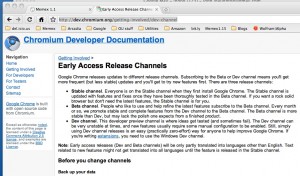Google’s developed its own systems programming language — and released it under an Open Source licence. Nice clear introduction by Rob Pike in this video.
Category Archives: Google
A Test Ride with the Droid
Useful review of the Droid. Summary: more powerful than iPhone (because of multitasking OS); less impressive Apps; GPS navigation terrific; much, much better network coverage.
Overturning Apple’s cart
This morning’s Observer column.
IF YOU want to understand what’s going on in the mobile phone business just now, think of it as a hen coop into which two foxes have recently arrived.
The first intruder is Apple, which was once a computer company and then had the temerity to break into the mobile phone business, where it has been wreaking havoc ever since. The second predator is Google, which began life as a search engine hell-bent on world domination, and sees mobile phones as a logical stepping-stone on the way. It has only recently found its way into the coop, but last week demonstrated its formidable potential for creative destruction…
How TomTom just got stuffed
Google GPS is more versatile, live — and free.
Google: the two-minute history
Google Chrome for Mac OS X
Following a tweet from Stephen Fry (who else?) saying “now running Chrome on OS X” I went looking and found (and downloaded) the build created by Codeweavers. Now running it — though not as a default browser because it’s not a stable version. The relevant Google page is here.
Judge Tells Google to Revise Its Book Pact by Nov. 9
From today’s NYTimes.
On Wednesday morning, Judge Denny Chin set Nov. 9 as the date by which Google and its partners must submit a revised settlement for the court’s preliminary approval.
The original agreement was negotiated between Google and representatives of the Authors Guild and the Association of American Publishers, who had sued the company, claiming copyright infringement, after Google began scanning books from university libraries. After the settlement was announced last October, it faced hundreds of objections from authors, academics, librarians, public interest groups and would-be rivals. Last month, the Justice Department recommended that the court reject the settlement as it stood.
The Justice Department, which submitted a 32-page filing to the court on Sept. 18, said it was concerned the agreement could violate antitrust law by giving Google “de facto exclusive rights for the digital distribution of orphan works.” Orphan works are books whose authors are unknown or cannot be found. The Justice Department also said it wanted the settlement to comply with procedures for class-action lawsuits.
Google’s inference engine
A friend sent me an email about the Renault Formula One ‘crash’ scandal. I read it in Gmail, and then noticed the ads that Google had selected to display based on its reading of the content of the message. Still, better than “Live Crash Experiences” or ads for the David Cronenberg film.
EN PASSANT: All the documents relating to the FIA Hearing on the incident are here (as PDFs). They make interesting reading. There’s also an audio recording of the Official statement.
Google displays its hand
This morning’s Observer column.
The scariest question a venture capitalist can ask a company seeking funding is: what if Google enters your market? For years, this question has haunted folk in mainstream advertising. They had already seen Google collar an overwhelming share of the targeted-advertising market via its AdSense and AdWords technology, the system through which small, hopefully relevant, text ads appear alongside the results of internet searches.
On the back of this, Google become a money-printing machine and now has nearly 70% of the paid-search market. This is nice for it in the short term, of course, but raises a strategic issue. What would the company do when the paid-search market was saturated? Where would the next growth area be?
What Google did next
If you were wondering why Google bought DoubleClick, then look no further. It’s moving into the display advertising business.
Three principles underpin our approach to the display advertising field:
1. Simplify the system for buying and selling display ads: For example, our DoubleClick ad serving products help advertisers and publishers manage campaigns and ad formats across thousands of websites and from thousands of advertisers.
2. Deliver better performance that advertisers and agencies can measure: We're building a host of new features to help advertisers to run display ad campaigns across the Google Content Network (comprising hundreds of thousands of AdSense partner sites) and on YouTube. We're also developing better measurement and reporting technology so they can figure out what's working and what's not.
3. Open up the ecosystem: We want to democratize access to display advertising and make it accessible and open, like search advertising. We recently launched the Display Ad Builder to help businesses easily set up and run display ad campaigns. 80% of advertisers who use that product have never run a display ad campaign before.
We’ve been working hard to put these principles into practice, and today we're excited to announce the new DoubleClick Ad Exchange, a step towards creating a more open display advertising ecosystem for everyone. The Ad Exchange is a real-time marketplace that helps large online publishers on one side; and ad networks and agency networks on the other, buy and sell display advertising space.
If I ran an advertising or media agency, this would have ruined my breakfast. Most agencies made their money by having (or claiming to have) expertise in a highly inefficient and opaque marketplace. Suddenly, the game has begun to change.
The first casualty, though, (as the NYT points out) is likely to be Yahoo, which up to now had the display-ad exchange space almost to itself.


